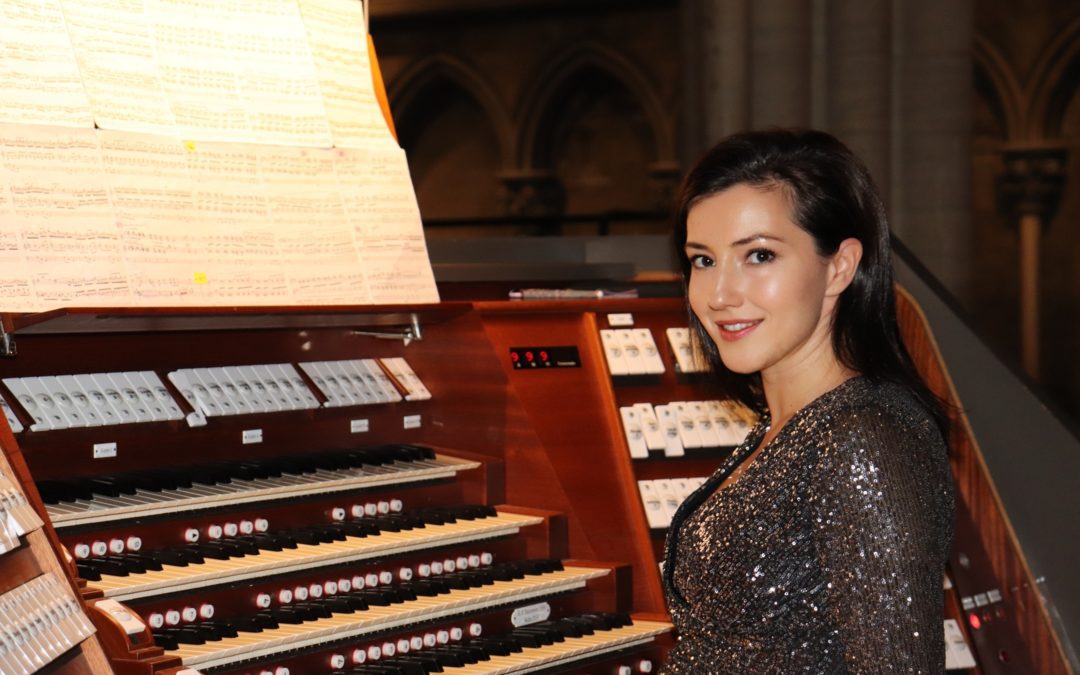On Wednesday 18th June we welcome Milkica Radovanovic from Norway for the fifth organ recital of our Summer 2025 season. In this edition of ‘Notes from an Organist’ we discover more about them, and what to expect from their recital, including growing up in Serbia, the importance of Bach’s music, and getting ready to play at Westminster Abbey.
Could you introduce yourself, how you got into music / become an organist and your musical journey to where you are today?
I started my musical journey as a pianist, and music has always been an important part of my life. Growing up in a small city in Serbia, the organ was something I only heard in movies or on the radio—it felt far away and almost mythical. Even then, I remember being fascinated by its sound, how it could fill a space with both power and tenderness.
When I moved to Norway, everything changed quite unexpectedly. I was continuing my studies in piano, working towards my Master’s degree, when I was asked one day if I could accompany some students on the Baroque organ in the church. From the very first time I played it, I was completely taken by the instrument. It felt like magic and pure happiness—like I had found a whole new side of music. That first experience opened up a whole new world for me, and I knew that was the way I wanted to go further on in my life.
Since then, I have dedicated myself to studying the organ, completing my Master’s and Postgraduate Diploma working with Inger-Lise Ulsrud, Vidar Vikøren and Bjørn Andor Drage as my teachers. My debut as a concert organist took place in Bodø Cathedral, and I have since been invited to perform in some of the most renowned concert halls and churches across Europe. I feel incredibly grateful to be in demand as an organist and to share the power and beauty of this instrument with so many audiences.
Beyond live performances, I share my work through videos and recordings that have been widely followed, commented on, and featured on various classical music platforms. I’m passionate about showing people how the organ can be both timeless and relevant, and how its seemingly old-fashioned and religious character only adds to its mystery and depth. My hope is always to bring out the magic of the organ and help others discover just how extraordinary this instrument truly is.
What can people expect from your recital at Bradford Cathedral?
At Bradford Cathedral, I’ve put together a varied programme I like to think of as a “trinity of sound,” weaving together grandeur, introspection, and spiritual reflection. It includes works by Handel, Albinoni, Norwegian composer Knut Nystedt, Marcel Dupré and Bach’s transcription of Vivaldi. My hope is to offer the audience a rich, memorable experience — where each piece brings something unique, yet together they create a single, unified story.
Why do you enjoy playing the organ?
I love playing the organ because every instrument is so unique—each one offers its own world to explore. With different stops and manuals there is a whole palette of sounds to explore and combine. It feels like being a conductor in front of an orchestra, with so many different instruments under your fingertips. That’s what makes the organ so special for me: it’s an instrument of endless possibilities, where you’re always discovering and sharing something new. Also Bach’s music has been a guiding light for me since I was a child playing piano. Later on, I had the chance to compete in the Bach competition in Leipzig as a pianist, which was a milestone and a way to connect even more deeply with his music. But playing his works on the organ feels like returning to the source where it all began. When I play his music on his instrument, it feels like I’m getting closer to the heart of his sound and ideas.
Do you have a particular favourite piece out of those you are playing?
It’s hard to choose a favourite because each piece has its own story and character. But I do have a special connection to the music of Marcel Dupré. His Symphonie-Passion is so full of energy and drama—it almost feels like stepping into another world. I love how it combines deep spirituality with a real sense of power. It’s one of those pieces that always keeps me on my toes and makes me feel alive as a performer.
This season’s theme is Bradfordian Organ Music – music from composers with a connection to the City and District. How are you reflecting this in your programme?
For this recital, I’m including Handel’s La Réjouissance—a piece full of festivity and joy, often played in moments of celebration and special occasions. It’s a work that really speaks to the spirit of community and shared joy, which I think is so important in Bradford’s musical life. By bringing this music together with works by Bach, Nystedt, Albinoni, and Dupré, I hope to create a programme that not only celebrates the local theme but also shows how music can connect us across different times and places.
What are your hopes or plans musically for the rest of 2025?
I have an exciting year ahead, with recitals in Spain, Germany, Denmark, Norway and a special performance coming up at Westminster Abbey. I feel honoured to be in demand as an organist and to share my passion for the instrument with audiences across Europe. My hope is to keep growing, keep exploring, and to continue sharing the organ’s music power and beauty wherever I go.
You have won a variety of competitions with your music; are there any particular awards that stand out for you?
Each competition has been an important step in my journey, and I’m grateful for the experiences they’ve brought. But the Bach competition in Leipzig stands out especially—partly because of the city’s rich musical heritage, and partly because Bach’s music has always been such an inspiration for me. It was a moment of deep connection with his works and a chance to share that passion with others.
You work as a piano and organ teacher at Ullensaker Kulturskole; is it exciting to teach music to the next generation of musicians?
Yes, absolutely. Teaching is a chance to pass on the joy of music and help students find their own voice. It’s also a reminder for me to keep listening and stay curious—students see things with fresh eyes, and that keeps the music alive. It’s a privilege to be part of their journey and to share in the excitement of discovering and growing through music.
Finally, how would you sum up your upcoming recital at Bradford Cathedral?
I see this recital as a way to share something meaningful with others. It’s a chance to bring these beautiful works to life in the unique space of the cathedral and to connect with the audience in a meaningful way. I see it as something I hope will resonate with people and leave a quiet, lasting impression.
You can join us on Wednesday 18th June at 1pm to hear Milkica’s organ recital, with an optional £4 buffet lunch beforehand at 12:30pm. You can find out more about them on their website, Facebook page, or Instagram channel.
You can discover more about our organ recital season on our dedicated page.

